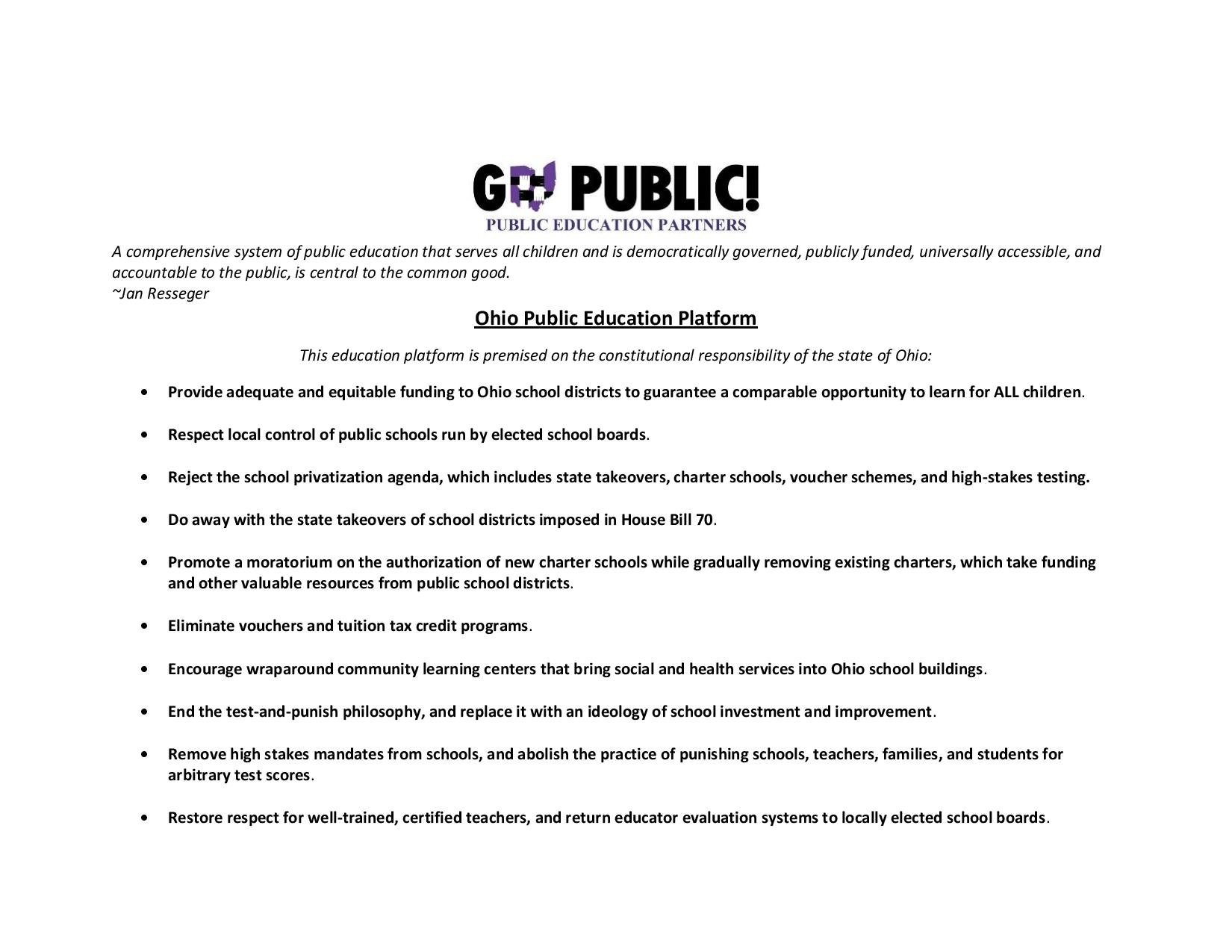
The state’s first obligation is to ensure that a thorough and efficient system is established and maintained. The state has no right under the Ohio constitution to fund alternative educational programs that diminish moral and financial support from the common school system. Ohio’s system of school was declared unconstitutional more than two decades ago, yet since that time $11 billion have been drained from the public school system for publicly-funded, privately-operated charter schools. This egregious flaw in state policy must be addressed.
Jan Resseger of Cleveland Heights, Ohio has aptly defined state and local responsibility for education as follows:
A comprehensive system of public education, that serves all children and is democratically governed, publicly funded, universally accessible, and accountable to the public, is central to the common good.
~Jan Resseger, Heights Coalition for Public Education
The education platform premised on the constitutional responsibility of the state of Ohio as stated in the preamble is:
•Provide adequate and equitable funding to Ohio school districts to guarantee a comparable opportunity to learn for ALL children. This includes a quality early childhood education, qualified teachers, a rich curriculum that will prepare students for college, work and community, and equitable instructional resources. https://drive.google.com/file/d/1WLdVez25ZjDzzd2irSUwUggj-GflNQuO/view?usp=sharing
•Respect local control of public schools run by elected school boards. There are different needs for different schools of different sizes, and each local school board knows what its students, families, and community values. http://www.nvasb.org/assets/why_school_boards.pdf
•Reject the school privatization agenda, which includes state takeovers, charter schools, voucher schemes, and high-stakes testing. The school privatization agenda has proven to be ineffective at bringing efficiency and cost savings to our schools. https://www.alecexposed.org/wiki/Privatizing_Public_Education,_Higher_Ed_Policy,_and_Teachers
•Do away with the state takeovers of school districts imposed in House Bill 70. State takeovers of school districts (HB 70), followed by the appointment of CEOs with power to override the decisions of elected school boards and nullify union contracts, are undemocratic, unaccountable, and without checks and balances. http://www.reclaimourschools.org/sites/default/files/state-takeover-factsheet-3.pdf
•Promote a moratorium on the authorization of new charter schools while gradually removing existing charters, which take funding and other valuable resources from public school districts. Charter schools remove funds and other resources from public school districts and need to be phased out. For-profit charter schools should be eliminated – tax dollars should never be transferred into private profits. https://knowyourcharter.com/
•Eliminate vouchers and tuition tax credit programs. Voucher schemes take desperately needed dollars out of education budgets and undermine the protection of religious liberty as defined by the First Amendment. https://educationvotes.nea.org/2017/02/08/5-names-politicians-use-sell-private-school-voucher-schemes-parents/
•Encourage wraparound community learning centers that bring social and health services into Ohio school buildings. These wraparound services ensure that the public schools are the center of the neighborhood, and they include health, dental, and mental health clinics, after school programs, and parent support programs. Cincinnati Public Schools has a very successful program of community learning centers: https://www.cps-k12.org/community/clc
•End the test-and-punish philosophy, and replace it with an ideology of school investment and improvement. The tests have narrowed the curriculum to the tested subjects. If national standardized testing is to continue, testing should be limited to the federal minimum guidelines, and there should be no state standardized tests beyond those mandated by ESSA. https://www.washingtonpost.com/news/answer-sheet/wp/2017/01/06/how-testing-practices-have-to-change-in-u-s-public-schools/?utm_term=.45d28f77dcb0
•Remove high stakes mandates from schools, and abolish the practice of punishing schools, teachers, families, and students for arbitrary test scores. Do away with mandatory retention attached to the 3rd Grade Reading Guarantee and high school end-of-course state tests. If parents choose to opt their children out of testing, no one should be penalized. http://www.fairtest.org/sites/default/files/Dangerous-Consequences-of-high-stakes-tests.pdf
•Restore respect for well-trained, certified teachers, and return educator evaluation systems to locally elected school boards. Dismiss Teach for America, which is funded by the Eli Broad Foundation and the Walton Family Foundation.
https://progressive.org/public-school-shakedown/went-wrong-teach-america/
Eliminate the practice of judging teachers by their students’ scores – research has proven it unreliable. http://www.fairtest.org/sites/default/files/TeacherEvaluationFactSheetRevisionJanuary2016.pdf
Inspired by Jan Resseger’s post: https://janresseger.wordpress.com/2016/07/05/my-public-education-platform/

